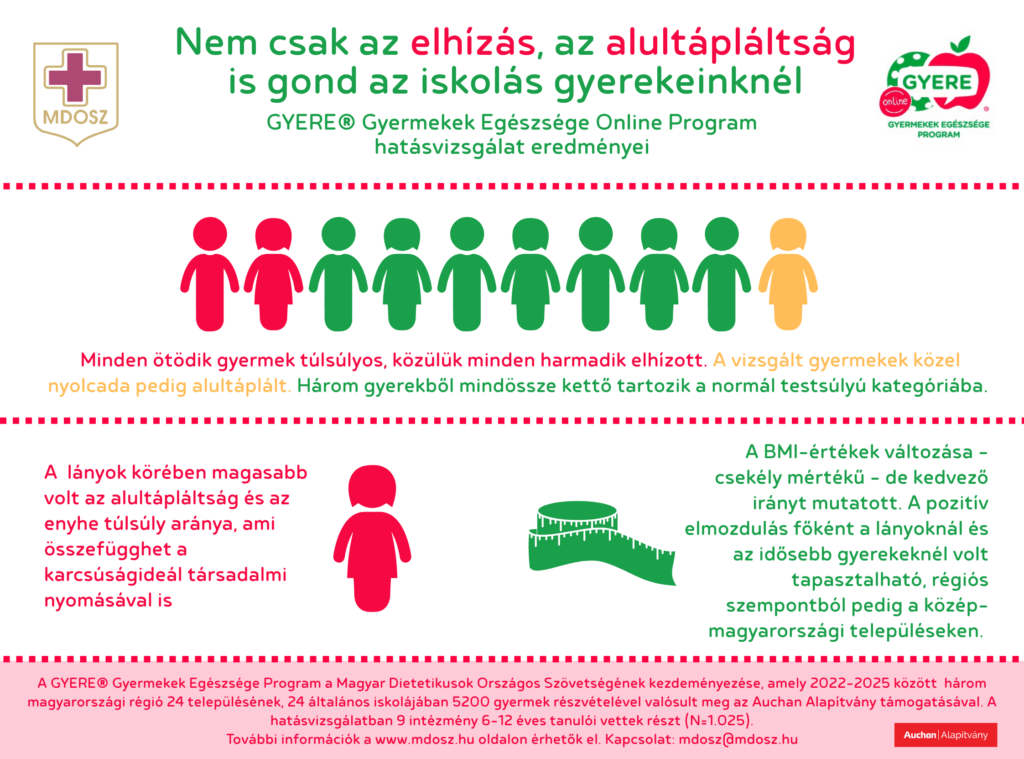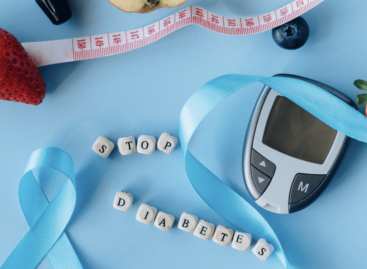Overweight, malnutrition, lessons learned: The impact assessment of the GYERE® Online Program has been completed
The Hungarian Dietetic Association (MDOSZ) has successfully concluded its three-year GYERE® Online Program, which ran from 2022 to 2025 in 24 primary schools across 24 Hungarian towns, involving 5,200 children. The goal of the program was to promote a healthy lifestyle, prevent childhood obesity, and foster community-wide attitude shifts – and the latest impact assessment shows it achieved partial success.
Positive but Moderate Changes
Throughout the program, more than 1,000 children aged 6 to 12 had their Body Mass Index (BMI) measured at the beginning and end of the initiative. Overall, the BMI results showed improvement – particularly among girls and children living in Central Hungary – although the overall distribution of nutritional status remained largely unchanged.
According to the sample:
-
65.6% of children had a normal weight,
-
15.0% were slightly overweight,
-
6.3% were obese,
-
and 13.1% were undernourished.
It is particularly concerning that over one-fifth of children are overweight or obese, while nearly one in eight is undernourished.
Social Pressure and Gender Differences
Significant gender-based disparities emerged in the results: girls were more likely to be undernourished or slightly overweight, and less likely to be in the normal weight category. This may be linked to societal ideals around thinness, notes MDOSZ president Zsuzsanna Szűcs. However, no major differences were observed across age groups.
Regionally, undernourishment among girls was more common in Eastern Hungary, while overweight and obesity – especially among 11-year-old boys – were more prevalent in Western Hungary.
An Online Program with Real Impact
The GYERE® Program – the Hungarian adaptation of the international EPODE (Ensemble Prévenons l’Obésité Des Enfants) initiative – aimed to reinforce healthy lifestyle habits in everyday routines. Delivered in a hybrid (in-person and online) format, the curriculum focused on nutrition, physical activity, playful engagement, and family-level awareness. The final stage, supported by the Auchan Foundation, took place in towns where Auchan stores operate.
Zsuzsanna Szűcs emphasized that while addressing childhood obesity is a complex challenge, community-based, long-term prevention efforts can shape attitudes and lay the foundation for lasting healthy behaviors. MDOSZ hopes future GYERE® Programs will reach an even broader audience.
Background: The History of GYERE®
The Hungarian GYERE® Program began in 2014 in Dunaharaszti and later expanded to Szerencs and Diósgyőr. Over the past three years, the project was implemented in primary schools across 24 towns. The program provided digital educational materials, interactive challenges, and community events for children, teachers, and parents – all accessible online.
Program materials and more details are available at www.mdosz.hu.
Related news
Health is decided at the family table – dietitians show the everyday application of the SMART PLATE® nutritional recommendation
🎧 Hallgasd a cikket: Lejátszás Szünet Folytatás Leállítás Nyelv: Auto…
Read more >Diabetes: the key to prevention is “smart” carbohydrates and fiber – MDOSZ has published a fresh summary
🎧 Hallgasd a cikket: Lejátszás Szünet Folytatás Leállítás Nyelv: Auto…
Read more >Related news
How does the forint exchange rate affect consumer prices?
🎧 Hallgasd a cikket: Lejátszás Szünet Folytatás Leállítás Nyelv: Auto…
Read more >HELL CITY has arrived, led by Michele Morrone
🎧 Hallgasd a cikket: Lejátszás Szünet Folytatás Leállítás Nyelv: Auto…
Read more >Two million people have already voted, so 57 million forints will be given to locals in 125 settlements, courtesy of Tesco
🎧 Hallgasd a cikket: Lejátszás Szünet Folytatás Leállítás Nyelv: Auto…
Read more >









